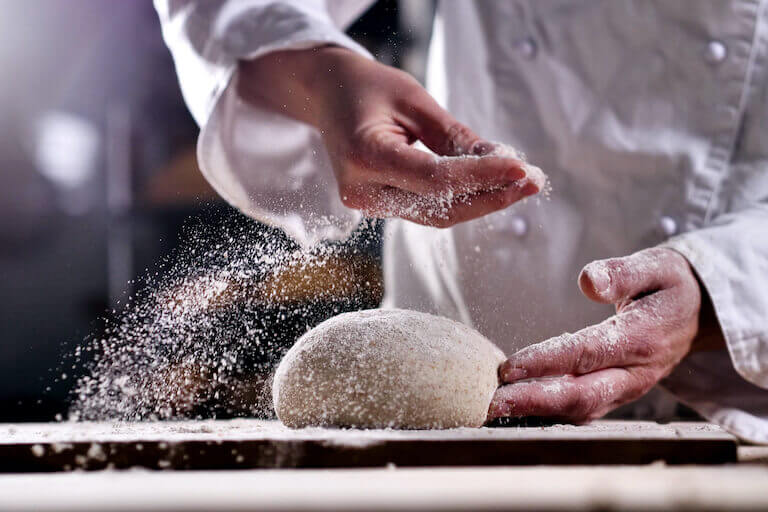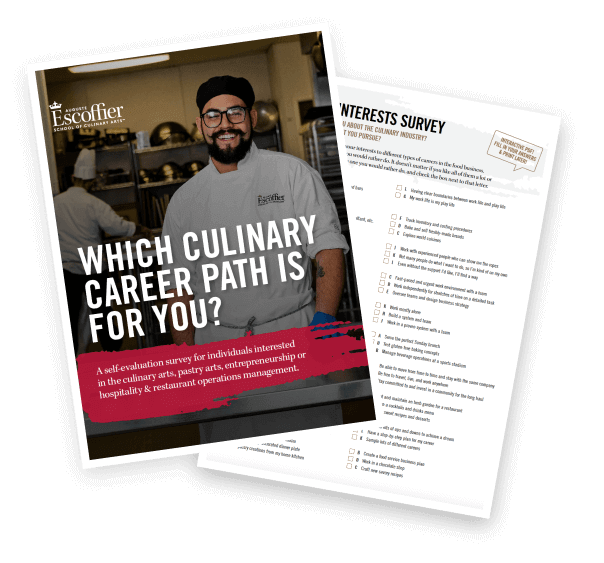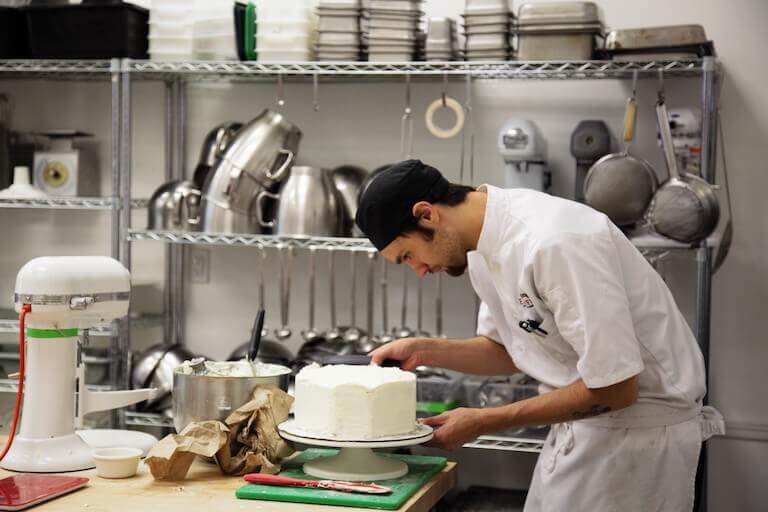There’s no shortage of career options once you’ve graduated from a baking and pastry school. Depending on the direction you want to take, you might be prepared to work for a restaurant or catering company, run your own food truck, or consider opening a bakery.
Baking is a huge industry in the United States. And according to Future Market Insights, the global bakery products market size is projected to reach over $354 billion by 2032!
If you’re wondering how to open a bakery, following these steps can give you a good start.
1. Determine Your Product Niche
If you’re thinking of opening a bakery, you’ll want to make sure your product stands out in the crowd. Take time to do some market research—either informally or professionally—to figure out the product line that will appeal to your market and underscore your strengths and skills.
Do you want to focus on wedding cakes or cookies? Doughnuts or savory pastries? Will you cater to a kosher market or perhaps go gluten-free? One of the best ways to determine your specialty is by assessing what you most enjoyed during your training or education.
Students enrolled in Escoffier’s baking & pastry program can explore the fundamentals of baking, as well as business concepts such as menu design, restaurant management, and cost control. Towards the end of the program, students can also secure an industry externship to gain hands-on experience in the kitchen that may mirror their future work in the industry.
This pivotal experience in culinary school might help you get laser-focused on your niche and your brand. It can give you the leg-up you need over the competition when opening a bakery.

Baker assembling ingredients as part of product niche.
2. Consider Location, Location, Location
It probably seems like obvious advice, but really scrutinize the size and demographic of your desired location to make sure your market is a match. Be optimistic…and also realistic. Think about your plan for growth and whether you desire to stay small and mighty. If you want to expand, consider how you might acquire more resources to support this expansion, such as more ovens, bigger refrigeration units, and a larger staff.
Additional Location Factors to Consider:
- Is it going to be a commercial kitchen or a retail space?
- Will you need a bathroom…and will it have to be accessible?
- If you plan for growth, where would you move to if you needed more space?
- Where would you open a second location if you decide to franchise?
3. Raise the Dough
Like any other start-up, launching a bakery won’t be cheap. The process of securing the capital you need to start your business can be extensive, so it’s a good idea to get started as early in the process as possible.
Common Ways to Secure Capital
Most business owners fund their founding with a combination of different streams. You’re probably going to need a bank loan. Getting investors is another helpful source of funding, and whether this is done through pitching your concept to investors with lots of capital or through crowdfunding and receiving many small donations, getting other people enrolled in your goal is becoming more possible through the use of technology.
“However much you think starting a bakery might cost… double that. When all is said and done, once you open, you’re not making money. You’re paying back your investment. For this reason, you want to have about 3-6 months’ operating capital in the bank to cover unforeseen expenses and possibly even payroll.”*
Chef Steve Konopelski, Escoffier Pastry Arts Chef Instructor
Additionally, check out your local Chamber of Commerce or small business association. There are sometimes start-up grants or tax incentives for new businesses. These organizations can also prove to be very helpful in connecting you with local businesses that may look to partner with your new bakery or even local investors who want to support businesses within the community.
Securing a lease can take time and possibly involve paying a consultant to make sure you cover the legalities and liabilities properly. Sourcing your equipment, ingredients, staff… all these things can take both time and some financial investment before you’ve even turned on the oven.

4. Get Your Permits
Check in with your city planning department and ask questions. Any food service establishment will need special permits and licenses, and typically you’ll need to get an inspection from the Health Department.
In fact, it’s best to involve the Health Department as soon as you can—the earlier in the process, the better. The laundry list of requirements they have may actually help you decide on your location. If the requirements are lengthy, finding a space with a pre-existing, fully equipped kitchen may save you money in the long run, instead of having to outfit one from scratch.
There will also likely be local rules that aren’t necessarily state-wide—and some of them might surprise you. However, it’s important to remember that local regulators are there to help you succeed…check in with them to make sure your business space will be up to snuff.

Take the Culinary Career Survey
We’ve compiled a checklist of all of the essential questions into one handy tool: career options, culinary interest surveys, educational opportunities, and more.
5. Equip Your Facility
Baking certainly requires specialized equipment. You may need to consider your baking specialty—are you making cakes, cookies, or croissants? You’ll also need to consider the size of your facility—can your space hold industrial-sized fridges, freezers, mixers, and ovens, as well as cooling racks and display cases. Find out what you need, what you can fit, and where to obtain this equipment. To stay within budget, many budding bakery owners might scour the internet for secondhand equipment that’s still in relatively good condition.
Also, do your research to find where you can save on wholesale ingredients. Running a bakery means baking in large quantities, so you’ll want to be savvy with your ingredient purchases and stock up on any deals you can find. Large-scale food providers may also offer assistance with food costing and menu planning/design. They can be a great resource in planning a menu.

Baker using kitchen equipment deliver cakes to customers.
6. Build Your Team
Finally, you may need to hire employees to help you run your shop. This task in itself can require a lot of time, consistent job marketing, interviewing, and follow-up communication, and typically some trial and error.
One key—and we can’t stress this enough—is to start small, ensuring that you can support the salaries of anyone you hire. The last thing you want to do is overestimate what you’ll be bringing in and end up having to let go of the people you just hired.
“Teamwork is dream work, and you need to have one eye and one ear on everyone else in the space at all times.”*
Chef Steve Konopelski, Escoffier Pastry Arts Chef Instructor
In fact, many bakery founders exclusively do the work themselves until they reach a comfortable level of profitability. But even hiring one or two people to join your team can save you exhaustion and potential burnout, and help you keep the shop open for more extended hours (potentially meaning more money in your pocket).

Building your own team is an essential step to opening a bakery.
Take the Next Step to Open a Bakery
Opening your own bakery is no small feat. Each of these steps requires grit and determination. But beyond that, having foundations of knowledge in writing business plans, networking, and of course, baking itself, can significantly impact the success of your future operation.
Escoffier’s degree and diploma programs in the baking and pastry arts or food entrepreneurship can help you further explore how to open a bakery and potentially turn your dream into a reality.
Did you enjoy this article? Then you’ll probably like these ones, too:
- 6 Advanced Baking Techniques Every Pastry Chef Should Know
- Sanitation Best Practices in Bakeries
- What Can You Learn in Baking School?
This article was originally published on February 24, 2016, and has since been updated.
*Information may not reflect every student’s experience. Results and outcomes may be based on several factors, such as geographical region or previous experience.

 “However much you think starting a bakery might cost… double that. When all is said and done, once you open, you’re not making money. You’re paying back your investment. For this reason, you want to have about 3-6 months’ operating capital in the bank to cover unforeseen expenses and possibly even payroll.”*
“However much you think starting a bakery might cost… double that. When all is said and done, once you open, you’re not making money. You’re paying back your investment. For this reason, you want to have about 3-6 months’ operating capital in the bank to cover unforeseen expenses and possibly even payroll.”*

